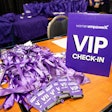It’s a planner’s worst nightmare: An attendee, speaker or exhibitor suddenly becomes ill, has a heart attack or a life-threatening allergic reaction. Or you face a widespread situation affecting all your guests and staff, such as food poisoning, Norovirus or the recent Legionnaire’s disease outbreak at an Atlanta hotel. Here are some best practices that will help you prepare for challenging circumstances.
Create a Strategic Crisis Management Plan
“I don't think most planners prepare for medical crises; some planners will identify where the closest hospital is to the event venue, but many don't even do that,” says Tyra Hilliard, Ph.D., CMP, an attorney and professor in Saint Simons Island, Georgia, who specializes in legal and crisis preparedness issues for the meetings, events and hospitality industries.
“I think planners assume that local emergency medical services and hospitals can handle anything that happens.”
Rather than assuming, be proactive when event planning, suggests Hilliard. “Especially for international meetings, consider what the standard of medical care is and what the average response time is for ambulances at remote resorts versus downtown hotels,” she says.
Planners may want to line up medical travel assistance services including medical evacuation offered by companies like WorldAware, or hire an on-site doctor from a provider like InHouse Physicians.
“Consult with experts on risk management before a crisis occurs so a plan can be put in place,” adds Hilliard.
Prevention Is Worth a Pound of Cure
Take steps to prevent medical crises by doing thorough RFPs and site visits, says Alan Kleinfeld, CMP, CMM, owner of Arrive Conference Solutions, a safety and security service that specializes in the meetings and events industry.
“Work with your supplier partner to confirm food is handled safely and according to any regulations and ordinances,” he advises.
“Confirm the kitchen is cleaned and maintained regularly or as mandated by law. In some cities, hotel kitchens are regulated like restaurants and go through the same “grading” system. Make sure the venue has a water management plan in place, that it’s following it and that the plan is regularly reviewed and tested.”
On-the-Spot Action
Advise attendees before the event that if they fall ill or get injured, they must inform organizers immediately, Hilliard suggests.
“Often, attendees go to the hospital and the planner doesn't find out until hours or sometimes days later,” she says.
If a medical issue affects only one attendee, the planner should contact that person’s emergency contact, gather their belongings if they’re in the hospital and assist with changing travel plans. Assign one of your staff members to accompany the patient, keep you informed and assist the attendee at the hospital.
When It's a Matter of Life and Death
To prepare for cardiac episodes and strokes, communication with supplier partners is crucial, says Kleinfeld.
“Know what your venue can do: Are qualified staff trained in CPR? Is there an AED on-site?” he says.
In addition, know when and how to reach first responders and how your venue is involved in getting help where it's needed, he advises, adding that just because someone might feel and look fine after a fall or a fainting spell, they may still require medical attention.
Solid communication goes a long way to mitigating and responding to a crisis, says Kleinfeld. Make sure your planning staff knows whom to contact and under what circumstances.
“Some planners include phone lists and emergency contacts on the back of the staff name tags,” he said. “Assign planning staff different roles for when a crisis occurs. Know when to dial 911 and what information the dispatcher will need—address, type of emergency, location—and make sure your supplier or venue is kept in the loop.”
Your team should also know how to reach the venue contact. Often, that person has essential information about access points and available resources useful to first responders.
“If you have the regrettable experience of a death at an event, be prepared to contact a local chaplain or other pastoral caregiver for attendees as well as someone back home for the family of the attendee who passed,” adds Kleinfeld.
When Best-laid Plans Aren't Enough
Some crises simply cannot be prevented. Planners should understand the process for working with area health departments, says Kleinfeld.
“When something like the Legionnaire’s incident in Atlanta is discovered, work with your venue and local officials who can activate a response,” he suggests. “The quicker you can get those resources in play, the better off you'll be and the sooner you can slow or stop the spread.”
Planners should always designate a spokesperson long before a medical crisis or emergency to distill and communicate important information, advises Hilliard.
“Don't try to hide the truth,” she says. “Control the message, and respect the privacy of those affected by the medical crisis.”
If the incident impacts the meeting or other attendees, keep them in the loop, too, adds Kleinfeld.
“Make sure you have a consistent, honest but reserved message to get out to them,” he says.















